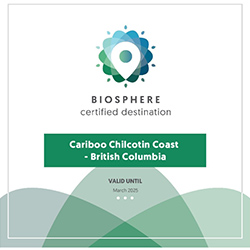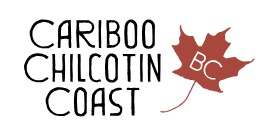As travellers seek more eco-friendly vacation options and aim to be more responsible in their impact on local communities, the concepts of Responsible Travel and Sustainable Travel have never been more relevant—especially when exploring destinations like the Cariboo Chilcotin Coast.
Who wouldn’t want to cast a line in the calm waters of BC’s Land of Hidden Waters or witness a busy bruin foraging along the serene waterline of the Great Bear Rainforest – knowing at the same time that their visit isn’t detracting or having a negative impact on the community and wildlife but rather adding to the long-term sustainability of the region so it can be enjoyed by future generations.
Read on to discover what some of the operators in the Cariboo Chilcotin Coast region are doing to reduce impacts on their surroundings and find your inspiration for an eco-friendly fall getaway.
Cariboo Chilcotin Coast: An Eco-Friendly Destination
The Cariboo Chilcotin Coast is a Biosphere Certified Destination, the second region in North America to receive international recognition from the Responsible Tourism Institute based in Spain. Biosphere destinations are committed to continuous improvement guided by the 17 Sustainable Development Goals of the United Nations, which include combating climate change, protecting the environment, supporting decent work and economic growth, and respecting cultural and social values. Discover the Cariboo Chilcotin Coast this fall and experience a destination that prioritizes sustainability!
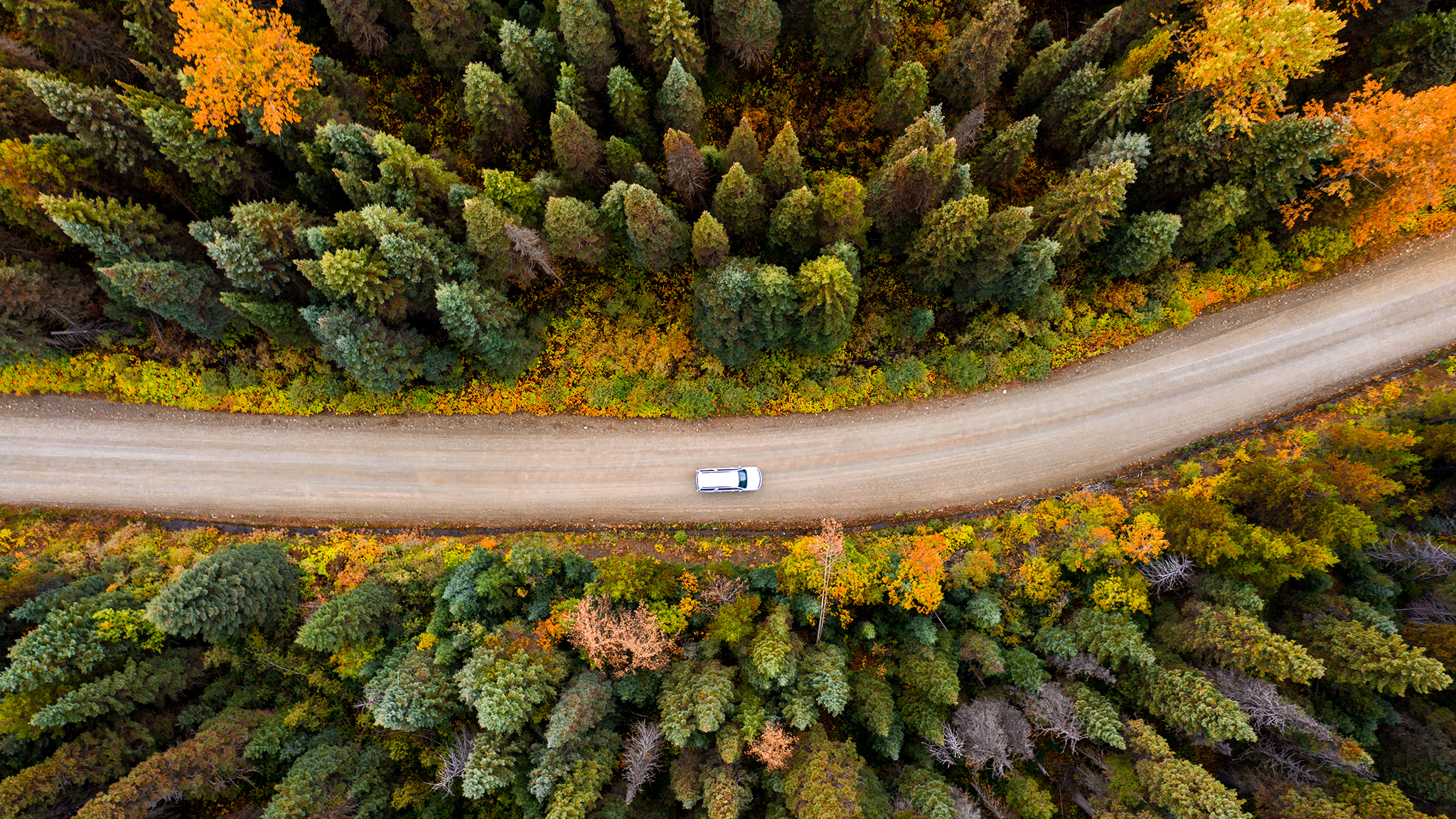
Likely to Barkerville | Tyler Cave
Cariboo Gold Rush Trail: Sustainable Adventures
The Gold Rush Trail is a must-stop for anyone planning an eco-friendly fall getaway in the Cariboo Chilcotin Coast, and you can learn more about this breathtaking historic region. Explore networks of trails, discover abundant wildlife and escape to wide open spaces. The constantly changing geography ranges from rare inland rainforest to arid locations. Visitors can explore lava-formed canyons, rolling grasslands, plus pine and aspen forests that explode in a kaleidoscope of colour this time of year. It’s certain that you won’t tire of the view outside your window, wherever you happen to stay.
Wyndham Hotels
Through numerous initiatives, hotels such as the Days Inn 100 Mile & Ramada Williams Lake, take steps every day to minimize the impact of their operations, working to reduce their environmental footprint and preserve natural resources.
Siwash Lake Wilderness Resort
Siwash is an incredible location that has partnered with National Geographic for many years to promote sustainability through tourism. They help visitors understand the effects of climate change, and inspire them to follow in Siwash’s green footsteps. Siwash is a Platinum-certified business by Green Step Sustainable Tourism, aligned with the United Nations Sustainable Development Goals for 2030, and the UN Declaration on the Rights of Indigenous Peoples. Siwash has also taken the Sustainable Tourism 2030 Pledge, a commitment to measuring and improving sustainability performance each year between now and 2030.
Echo Valley Ranch & Spa
Echo Valley Ranch is GreenStep Gold Certified – an individually assessed program, which includes a review by a trained sustainable business expert for factors including everything from energy efficiency to food sources. Echo Valley’s commitment to eco-friendly tourism includes being active and environmentally-conscious stewards of the land, making regular environmental choices in day-to-day operations, finding improvements for a carbon-neutral operation, and practicing zero-waste in food acquisition and production.
Additionally, visitors to Echo Vally can learn about surviving off the land with a Survival Spirit adventure, where they discover which plants are edible, how to build shelter, and how to find water. Alternatively, their Horse Harmony program teaches the power of trust with an animal to bring you closer to nature and to yourself.
Discover more fantastic places to stay this fall along the Cariboo Gold Rush Trail
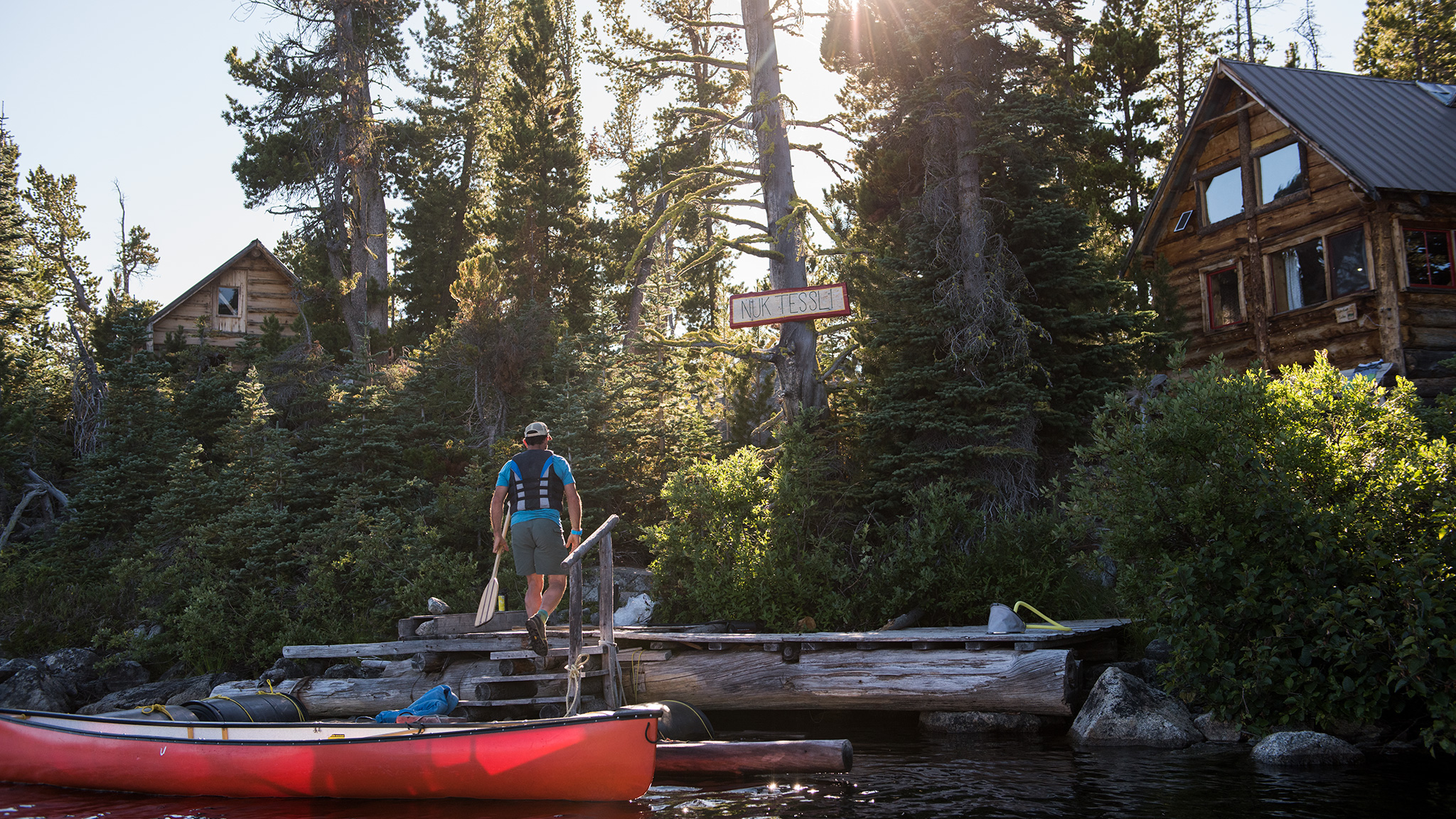
Nuk Tessli Wilderness Experience – Kleena Kleene, BC | Kari Medig
Chilcotin: Untouched Paradise
Travel through British Columbia’s living “Wild West!” complete with endless outdoor adventure. The Chilcotin’s vast landscape is home to an impressive diversity of wildlife set in the last intact Grasslands in the world. This includes Canada’s largest population of bighorn sheep, rare white pelicans, trumpeter swans, bears, lynx, wolves, mountain caribou and hundreds of wild horses. Fall is a fantastic time to view wildlife while they migrate and roam to feed themselves ahead of winter. While there are few communities and many kilometres of empty road to explore, there are also some spectacular eco-friendly places to stay:
Chilko Experience Wilderness Resort
The Chilko Experience strives to provide guests with a luxury standard while existing in harmony with its natural surroundings. Located 64 km (40 mi) from the nearest power grid, the lodge relies on 78 solar panels to provide the bulk of energy to the resort. Fresh water is provided by a well, and the hot tub is wood-fired and chemical-free. The onsite greenhouse provides vegetables, salads and herbs for daily meals and the resort uses local and organic foods whenever possible while also providing guests with biodegradable soaps and shampoos during their stay.
Nemiah Valley Lodge
Each booking at Nemiah Valley Lodge includes a Xeni Stewardship contribution, part of the Lodge’s global commitment to responsible and sustainable visitor and tourism initiatives. Contributions go directly to the further protection of #XeniWildBC and Nemiah’s ?Elegesi Qayus Wild Horse Preserve.
While staying at Nemiah Valley Lodge, guests will enjoy a creative culinary experience with fresh, local and Indigenous-inspired food infused with traditional knowledge and techniques. Guests can also learn about natural remedies and how the local Indigenous inhabitants use plants to feed and heal. Additionally, learn about the natural botanical plants of Xeni’s Wilderness and prepare a salve to take home.
Nuk Tessli
Since 2011, Nuk Tessli has been an off-grid ecotourism centre specializing in unique tailor-made hiking and canoeing trips. Nestled in the wilderness, guests are encouraged to explore on the water or land during the day. Later, visitors can return to the comfort of an outdoor, wood-fired hot tub perched against the Monarch Mountain. Breathe in the crisp fall air as the muted watercolour sky signifies another incredible autumn sunset in the wilderness.
KiNiKiNiK
During your stay with KiNiKiNiK, browse through the unique KiNiKiNiK store for local, organic items including organic pasture-to-plate meats, in-house prepared & preserved foods, candles and kitchen utensils. KiNiKiNiK is home to a natural sod live roof as a nod to traditional roofing styles. The Pasture to Plate restaurant (open May to Sept) offers wholesome, made-from-scratch food, with organic ingredients, and all meat is as local as it can get – sourced from animals born, raised and grass-fed fattened on Rafter 25 ranch land, where the restaurant is situated.
Find a complete list of accommodations in the Chilcotin here.
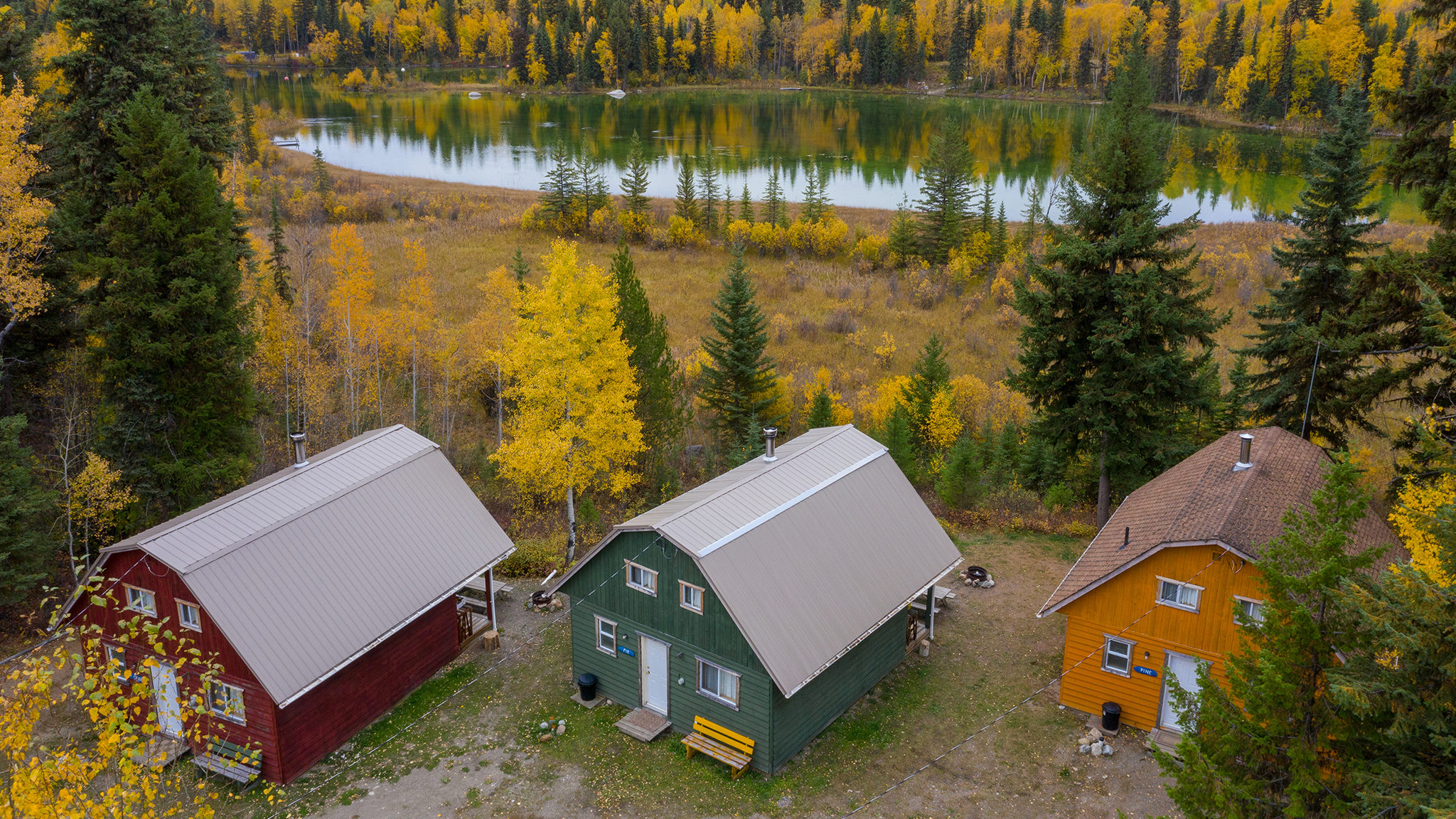
Ruth Lake Lodge | Michael Bednar
Land of Hidden Waters: Eco-Friendly Wonders
Surrounded by lakes, the Land of Hidden Waters, which includes BC’s Fishing Highway 24, is home to quaint lakeside cabins and family-friendly guest ranches for your eco-friendly fall escape. Not only is the landscape in this region of the Cariboo Chilcotin Coast incredibly beautiful this time of year as the trees make their annual transformation from green to gold, but the fishing is fantastic, too!
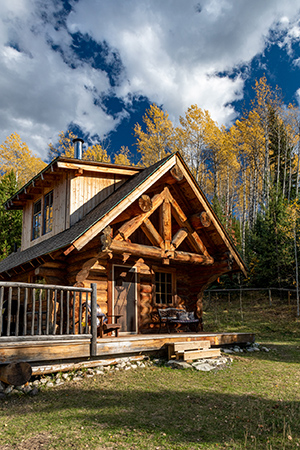
Wolf Valley Guest Ranch | Michael Bednar
Wolf Valley Guest Ranch
As a relatively remote, off-grid working ranch, Wolf Valley Guest Ranch utilizes solar energy to provide the lakefront cabins and the rest of the property with power. While you’re here, learn about natural horsemanship and hang out with the oldest registered breed of cattle in the world, Highland cows. You will learn about how Wolf Valley utilizes pastures for mother-related rearing of the calves without artificial fertilizers or concentrated feed. They also regularly share the area with local moose, deer, and other wildlife.
Ruth Lake Lodge
Situated adjacent to a natural wetland, Ruth Lake Lodge is home to a stunning shoreline teaming with waterfowl, beavers, otters, muskrats, songbirds, raptors and mammals – ideal for fall birdwatching and wildlife viewing. Each wild visitor survives off the bio-diverse plants and fish in this wetland sanctuary and, as such, the habitat is critical to the life cycle and survival of these animals. Make sure while you’re here to ask the team at the lodge to take you on a wetland exploration hike to learn about this diverse and vital ecosystem.
Explore more fall accommodations along the Land of Hidden Waters.
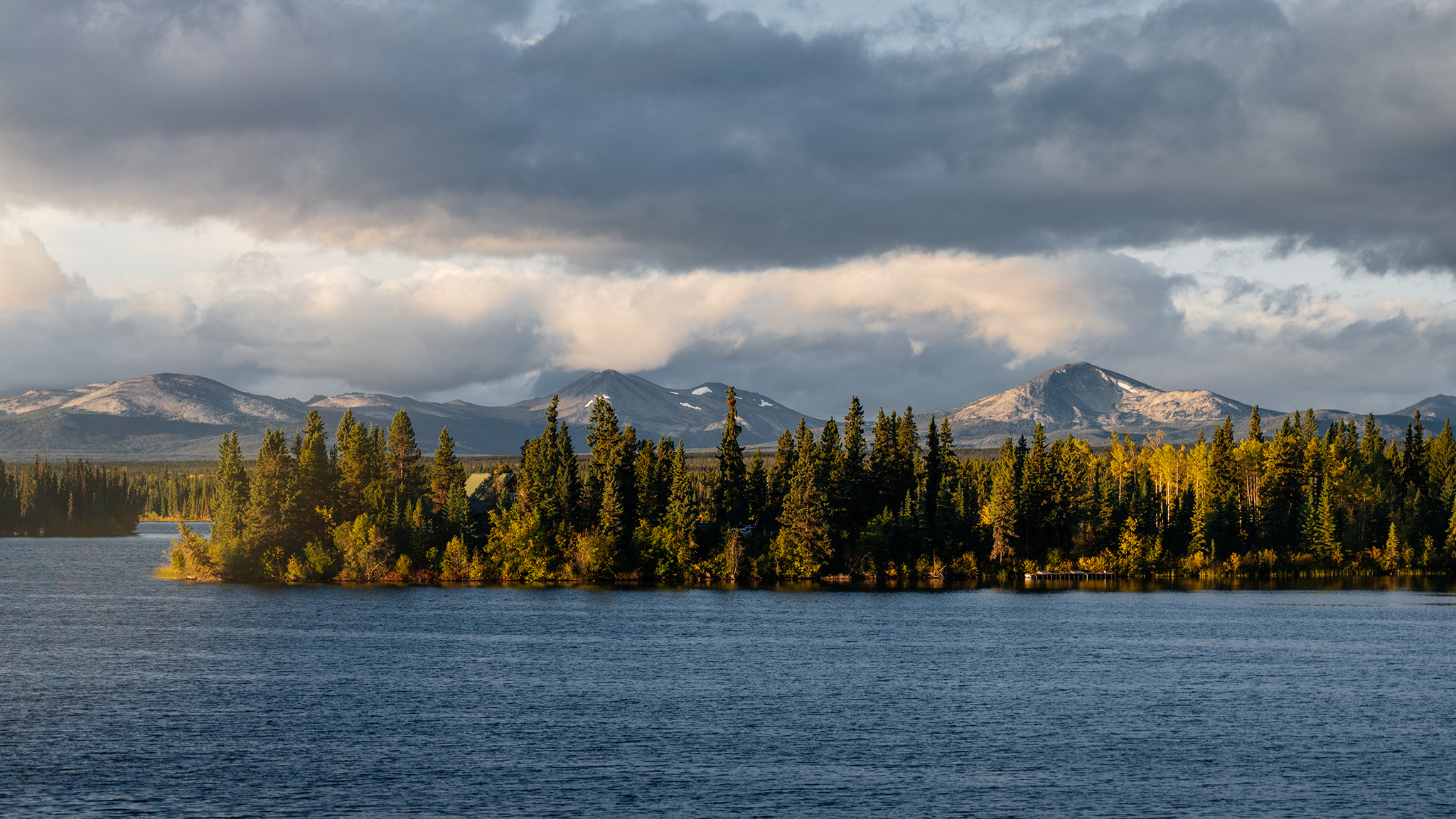
Nimpo Lake | Jesaja Class
Great Bear Rainforest: Sustainable Wilderness Retreats
As one of the largest intact tracts of coastal temperate rainforest left in the world (6.4 million hectares), the Great Bear Rainforest is a vital ecosystem for the province and a standout highlight in the Cariboo Chilcotin Coast. This wild, ruggedly beautiful place is a haven for those looking to immerse themselves in nature. In addition to exceptional fishing, wildlife watching (both on and off the water) and stunning landscapes, this area is home to a variety of eco-friendly operators. And did we mention that fall is a prime time for bear viewing? Book your tour with a certified Commercial Bear Viewing Association operator for the opportunity to view local grizzlies and grab the chance to perhaps spot the rare Kermode, or Spirit Bear.
Tweedsmuir Park Lodge
The lodge has made significant commitments to the local and worldwide community, recognizing the importance of preserving wildlife and the environment, so that future generations can experience the same wonders as are experienced today. They are committed to not just following environmental trends, but to be pioneers in creating a more sustainable and balanced business model, minimizing their environmental footprint and giving back to the environment and community.
Designated a Climate Positive company, their sister company, Bella Coola Heli Sports, is the first heli-skiing company to become climate positive. Carbon offsets equivalent to 110% of companywide emissions are purchased through the Great Bear Rainforest Carbon Project, so funds from the project go directly to Local First Nations Communities. The lodge also supports local research on Grizzly Bears in the Bella Coola Valley and Great Bear Rainforest, works closely with the Ministry of Environment & BC Parks to monitor wildlife in the area, and works with Parks on a fire protection program and improvements & services for park visitors.
The lodge also creates a sustainable experience for guests, with electric car charging stations, recycling, composting, environment-friendly cleaning products, high-efficiency appliances, and uses local & organic products wherever possible and does not serve farmed seafood. Only non-motorized boats are used on the rivers, and they encourage catch-and-release fishing.
Maple Leaf Adventures
Embark on a once-in-a-lifetime exploration of coastal BC waters with a company that has been featured by provincial and national governments as a leader in responsible tourism. With a $100,000 commitment over 10 years to the Raincoast Conservation Foundation and the Great Bear Rainforest, Maple Leaf Adventures partnerships help to meet their goals of conservation and ecotourism, and the goals of Raincoast’s coastal projects involving First Nations in the science and stewardship in the territory they call home.
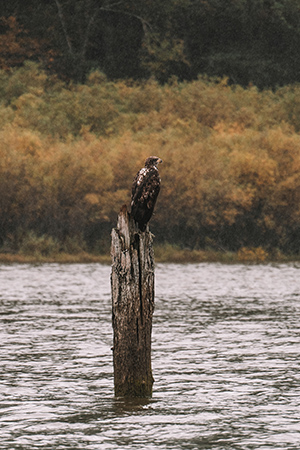
Bella Coola Grizzly Tours | Tyler Cave
Bella Coola Grizzly Tours
Bella Coola Grizzly Tours takes its commitment to eco-tourism seriously – doing everything possible to reduce environmental impact on day-to-day operations. The rich and fertile valley provides a perfect place to grow a large organic garden, so the resort is able to utilize locally-grown produce and vegetables while also incorporating free-range, farm-fresh eggs. Renewable resources are utilized wherever possible, and they maintain a conservative outlook on local natural resources.
Shearwater Marine Resort
Shearwater Marine Resort is owned and operated by the Haíɫzaqv (helts-uk) Nation and is dedicated to the protection of the Heiltsuk Territory as a unique wilderness area and quality paddling destination, with a hope that everyone who visits gains a greater sense of well-being and appreciation for the natural environment. Shearwater honours the traditional territories of the Haíɫzaqv (helts-uk) First Nation and works in cooperation and respect of their traditional unceded title of this land. Guests are encouraged to book a guided kayak eco-tour to learn more about the area and the ecosystem.
Suntree Guest Cottages
Suntree Guest Cottages reduces its environmental impact by generating its own hydroelectricity, using a Pelton wheel turbine capable of producing as much as 18 Kilowatts of electricity during normal operating periods using the natural resource of a mountain stream. Informational tours of the facility are offered at no charge for guests who would like to learn more.
Spirit Bear Lodge
To Spirit Bear Lodge, the term sustainable means that the wealth of forests, fish, wildlife and the complexity of all life will be here forever. The Kitasoo Xá:xais (kit-a-soo hay-hays) People here are dedicated to the protection of land, ocean and Culture. Eager to share their history, culture, and traditional knowledge with guests, visitors can also learn about current conservation efforts and the stewardship of their Traditional Territory. The Kitasoo Xá:xais (kit-a-soo hay-hays) have worked with governments and NGOs to protect over 50% of their Traditional Territory and created a “Protocol on the Environment,” which governs future use and conservation of all the lands and resources for generations to come. The Kitasoo Xá:xais (kit-a-soo hay-hays) First Nation Council and Hereditary Chiefs manage the territory based on stewardship and sustainability. This approach has allowed the community of Klemtu to grow economically as well as ensure that future generations will benefit from abundant natural resources, like their ancestors before them.
Great Bear Chalet
Autumn brings the return of pink salmon to the Atnarko River where, after spawning, become fuel for resident and transient grizzly bears. The convenient location on the bank of the Atnarko allows a front-row seat to the annual spectacle. The chalet itself is committed to excellence and an ecologically responsible lifestyle. Join them on an eco-river drift tour to celebrate the reign of the grizzly bear as monarch over their valley home.
H’aiagal’ath Grizzly Bear Tours
This Indigenous-owned and operated business offers ecologically sustainable and culturally authentic wilderness experiences deep in the Great Bear Rainforest. Join them to experience Wuikinuxv (whee-kin-au) richness, and immerse yourself while enjoying a memorable bear and wilderness viewing adventure in beautiful Rivers Inlet.
Find even more fantastic accommodations in the Great Bear Rainforest.
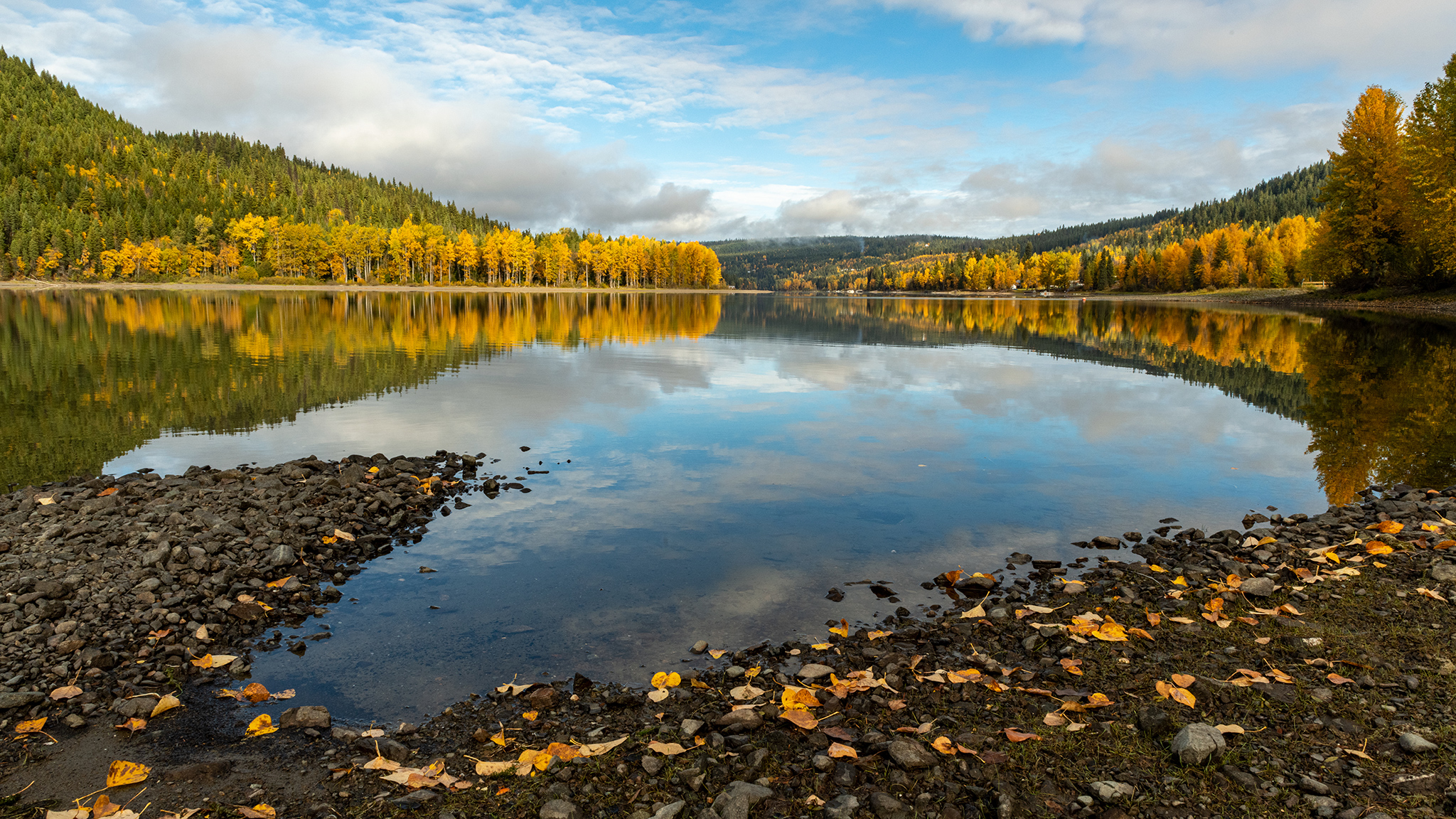
Likely
Create Your Own Eco-Friendly Fall Vacation
Are you thinking of staying in a different location but still want to ensure that your fall getawayt to the Cariboo Chilcotin Coast is eco-friendly? Consider purchasing carbon offset credits through the Great Bear Rainforest Carbon Project, a program spearheaded by the Coastal First Nations to offer carbon credit sales that help the nation end destructive industrial logging practices in the rainforest, protect important ecological and environmental values and generate their own source of revenue for economic self-sufficiency.
Additional tips for travelling sustainably include:
- Stick to a few locations rather than a larger geographic area
- Avoid peak travel times (typically summer) when there’s more impact on local resources
- Buy local where possible
- Seek out local experiences that give back to the community and local economy
- Pack light and bring reusable products
Responsible travel and sustainability also go hand in hand, so we encourage a review of our responsible travel guide before your visit!



